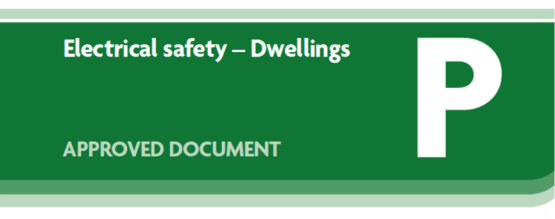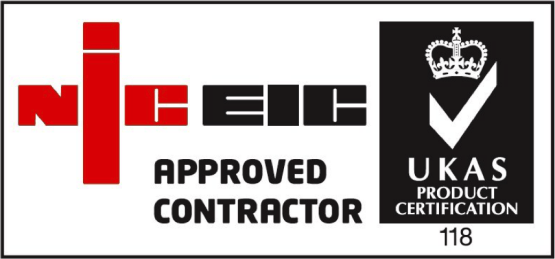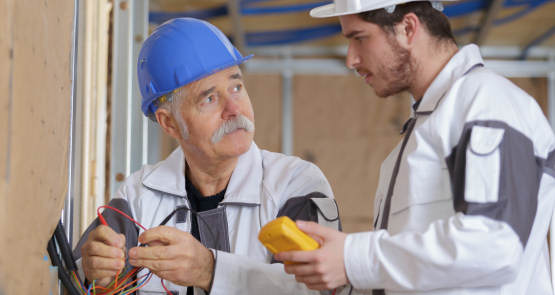All electrical Installation work, electrical testing and any electrical periodic inspections should always be accompanied with the correct paperwork for the task undertaken and all reports and certificates issued will include the electrical test results and inspection schedules. You should retain this paperwork and store it in a safe place so you can access it at any time.
Depending on the nature of electrical work installed, the type of inspection and testing required or the size of the task ahead will determine the report and certification you will receive.
Electrical certificates for alterations, new installations or small additions
(MEIWC’s) Minor Electrical Installation Work Certificates & (EIC’s) Electrical Installation Certificates provides a declaration for the person responsible for the electrical installation safety. It states that an addition, new installation or an alteration is safe and can be used safely at the time installation was put into use.
It is prudent to store these certificates in a safe place so they can be accessed at any time as they can provide vital information for future inspections and testing that may be required so saving you money for potential exploratory investigation work that otherwise could well be necessary in the future. Electrical Installation Certificates (EIC’s) can also be used as documentary evidence in court where a claim has been made for injury or a fire was started due to a faulty electrical installation. It can prove an installation has been fitted correctly and safely meeting all necessary standards and regulations.
The Electrical Installation Certificate (EIC) will specify the following:
It is mandatory to issue an Electrical Installation Certificate (EIC) when a new electrical installation has been installed. It can also be used for an addition or alterations but is dependant on if a new circuit has been fitted. If a new circuit has not been fitted you still can use an Electrical Installation Certificate (EIC) or you can use a Minor Electrical Installation Work Certificates (MEIWC)
Always ensure you use a NICEIC registered tradesman contractor. This will ensure you receive and be issued with the right form of certification certificate for the work that has taken place.
Part P building regulations
In 2005 all domestic electrical installations in England & Wales for tradesman contractors and the DIY enthusiast are required to comply with Part P of the Building Regulations. These regulations were amended in April 2013. The work undertaken may or may not be necessary to notify building control but the Part P intension is to maintain safety for you when an electrical installation is taking place.
Part P regulations & requirements are applied to all additions and alterations of existing domestic dwellings to include a partial rewire or a rip out and full installation rewire. It also applies to new build domestic dwellings such as house bashing sites.
Part P states – "Any person performing electrical work or installations to a new or existing dwellings are to ensure that they have made reasonable provisions for the design & installation for the electrical work taking place so as to ensure protection to persons who may use it, maintain it or amend the installation in some way and to ensure that the installation is risk free from fire and electrical shock which may cause injury."
Part P responsibility
It is mandatory law that the landlord or the homeowner can prove that any electrical installation work carried out complies with part P regulations. It is a criminal offence not to comply and if they fail to do this they will be committing an offence of which they can be prosecuted.
Building regulations or local authorities can force landlords or homeowners to change, alter, amend or even remove all and any electrical installation work that does not comply with current part P Building Regulations.
Electrical work declarable includes:
An electrical notification is only declarable to an already existing circuit in a area containing a shower or bath in what’s known as zone 1 and zone 2.


Things I must prepare for prior to electrical work being performed in my home
Your first priority is to find out if the proposed works are declarable to Building Control.
If it is then you must do one of two things:
In April 2014 the law changed to allow you to seek the services of a non-registered electrician to perform your work. He must employ a registered third party body that are able to carry out a test, a full inspection prior to the works commencing, during the works installation, and can certify the works after the installation is complete.
Use a registered electrician
It is prudent to always use a registered electrician when carrying out electrical work to your home or a property you own. By doing so you will ensure that all your electrical installation work will be to current regulations meeting BS 7671 UK national standards, which is the requirements for all electrical installations, and will be safe to use. It will not be necessary for you to have any contact with Building control directly.
After the works are completed you will receive:
If any installation work performed by you’re appointed registered electrician does not meet current Building Regulations there is a formal complaints procedure in place for your perusal. Another avenue would be to insure the proposed works by having an insurance backed guarantee. If the work carried out is found to be substandard and not to current Building Regulations you may have grounds for a claim.
If I do not use a registered electrician
When using a non registered electrician to install your works that person must get in touch with a registered electrician to inspect and test the works. However, this notification made to the registered electrician must take place no more than five days after the works are completed. If after inspection and test the installation passes they can certify the works by issuing the person who instructed the works one of two types of report. Either a report that is specific for the use of Part P or an Electrical Installation Condition Report (EICR) shown in BS 7671 parameters.
Where can I find a registered electrician?
There are many ways to find a competent electrician. You can ask local electrical merchants who deal with electricians on a daily basis. A family member or a friend can recommend a registered installer as they may have already used one. You can always search for a regulatory body such as NICEIC, ELECSA or NAPIT to discover who are members. NICEIC logo is shown below so you know what to look for.

Electrical certificate explained?
Nothing lasts forever and will deteriorate over time. This also relates to electrical installations. So with this in mind its prudent to perform a periodic inspection, which is an electrical inspection & test carried out every three to five years to keep the system running safe. These checks can also be known as a Domestic Electrical Installation Condition Report (DEICR).
It will include:
The majority of Housing Associations, Estate Agents, Letting Agents and Local Councils will not accept anything less than an Electrical Certificate that has been issued by a registered electrician. It is also good practice as if an accident was to happen involving an electrical incident you might find that your insurance will require a valid electrical certificate. If you cannot provide one you may not be covered.
Follow these guidelines:
Our checks we perform are:
Once we have carried these checks we will issue you an Electrical Installation Condition Report (EICR). This report will give the results of our inspection checks identifying all and any defects, damage, wear & tear, deterioration, dangerous areas, and anything that does not comply with current standards.
Anything found and identified as dangerous to the installation will be declared as unsatisfactory and immediate remedial work is required to eliminate the potential risk of harm to occupants of the property or building.
Why Choose Acorn Electrical & Mechanical
We are based in Plymouth Devon so we cover the complete South West. We have a team of skilled electricians who are passionate about their work and have been doing it for over 15 years.
Our team offers:
Please feel free to call us for help or advice.
If you are interested in booking a survey for any of our services or just a safety check, please contact Acorn Electrical & Mechanical (AEM) and a member of our team will be happy to help or advise you. CALL now on 01752 201077 or 07779 777965

